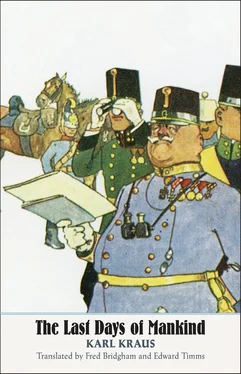They fancied they could conquer the world market — the goal that was their birthright — as knights in shining armour; they have to make do with a less glorious trade and sell their gear in the flea market. No wonder they can’t stop saying “Don’t mention the war”! And it is to be feared that some future age, sprung from the loins of this desolate generation, will have no greater power of understanding, despite being at a greater distance. Yet an unqualified admission of guilt at belonging to mankind, as it currently exists, must at some place and time be welcomed and valued. And “even while men’s minds are wild”, let us (echoing Shakespeare) deliver Horatio’s message to the forces of renewal as a judgment arising out of the ruins:
And let me speak to th’yet unknowing world
Of carnal, bloody, and unnatural acts,
Of accidental judgements, casual slaughters,
Of deaths put on by cunning and forced cause,
And, in this upshot, purposes mistook
Fallen on th’inventors’ heads. All this can I
Truly deliver.
Prologue
Scene 1 (p. 29)
(Vienna. At the corner where the Kärntnerstrasse meets the Ring and people take their evening stroll.)
Newspaper vendors. A passerby. His wife. Four officers. Two sales reps. Fischl. A Viennese. His wife. Regular subscriber to the Neue Freie Presse . Oldest subscriber to the Neue Freie Presse . Some drunks. Four young men arm in arm with their girls. The crowd. Fritz Werner. Fräulein Löwenstamm. Fräulein Körmendy. An intellectual. His wife. Poldi Fesch. Policeman. Two petty bourgeois. Two reporters. Cabby.
Scene 2 (p. 34)
(Café Pucher.)
Eduard, headwaiter. A banker. A stranger. Franz, a waiter. Prime minister. Minister of the interior. Head of the cabinet office.
Scene 3 (p. 36)
(Office in the Comptroller of the Imperial Household’s chambers.)
Nepalleck.
Scene 4 (p. 39)
(Same.)
Usher. Nepalleck.
Scene 5 (p. 39)
(Same.)
Nepalleck. Old manservant.
Scene 6 (p. 40)
(Same.)
Nepalleck. Montenuovo. Old manservant.
Scene 7 (p. 40)
(Same.)
Montenuovo. Nepalleck.
Scene 8 (p. 40)
(Same.)
Usher. Prince Weikersheim. Nepalleck.
Scene 9 (p. 41)
(Same.)
Nepalleck.
Scene 10 (p. 41)
(Southern Railway terminal.)
Nepalleck.
The following marionettes:
Angelo Eisner v. Eisenhof. Spielvogel and Zawadil. Hofrat and Hofrätin Schwarz-Gelber. Dobner v. Dobenau. Count Lippay. Riedl, café proprietor. Dr. Charas. Stukart, head of security. Wilhelm Exner, section head. Sieghart, Land-bank governor. Landesberger, Anglobank president. Herzberg-Fränkel. Stein and Hein, progressive-liberal municipal councillors. Stiassny and Stiassny, consuls. Three honorary counsellors. Sukfüll. Birinski and Glücksmann. Hugo Heller, bookseller. Flora Dub. The Grumbler. Journalist.
Prologue Extras:
Promenaders, passersby, coffeehouse staff, the public, policemen, dignitaries, court society, ladies of the higher nobility, clergy, municipal councillors, notabilities, lackeys, journalists.
Act I
Scene 1 (p. 47)
(Vienna. At the corner where the Kärntnerstrasse meets the Ring and people take their evening stroll.)
Newspaper vendors. Demonstrator. An intellectual. Ruffian. Prostitute. Several passersby. The crowd. Two reporters. Two army suppliers. Four officers. A Viennese. Voices from the crowd. Beggar boy. Two girls. A policeman. Another intellectual. His girlfriend. A fare. Cabby. House-porter. Two Americans from the Red Cross. Two Turks. Two Chinese. Lady with just the hint of a moustache. A circumspect person. The voice of a cabby. A voice. Passerby. His wife. Troop of boys in military peaked caps and with wooden sabres. Group of singers. Bag snatcher. His victim. A female voice. Poldi Fesch. His companion. Two devotees of the Reichspost . Enlisted soldiers singing. A regular subscriber to the Neue Freie Presse . The oldest subscriber. Fritz Werner. Fräulein Körmendy. Fräulein Löwenstamm. Three ruffians. Two sales reps.
Scene 2 (p. 59)
(South Tyrol. The approach to a bridge.)
Member of the Tyrolean territorial reserve. The Grumbler.
Scene 3 (p. 60)
(The other side of the bridge.)
Soldier. The Grumbler. Captain.
Scene 4 (p. 60)
The Optimist and the Grumbler.
Scene 5 (p. 62)
(The Foreign Office.)
Count Leopold Franz Rudolf Ernest Vinzenz Innocenz Maria. Baron Eduard Alois Josef Ottokar Ignazius Eusebius Maria. The voice of Berchtold.
Scene 6 (p. 65)
(In front of a hairdressing salon in the Habsburgergasse.)
The crowd. Violin shop owner. Hairdresser. Friedjung, a historian. Brockhausen, a historian.
Scene 7 (p. 67)
(Kohlmarkt. Outside the revolving door at the entrance to Café Pucher.)
Old Biach. Honorary Counsellor. Businessman. Intellectual. The Grumbler. Haberdasher.
Scene 8 (p. 69)
(Suburban street.)
Four young men. The proprietor of Café Westminster.
Scene 9 (p. 72)
(A primary school.)
Teacher Zehetbauer.
The boys: Anderle, Braunshör, Czeczowiczka, Fleischanderl, Gasselseder, Habetswallner, Kotzlik, Merores, Praxmarer, Sukfüll, Süssmandl, Wottawa, Karl Wunderer, Rudolf Wunderer, Zitterer.
Scene 10 (p. 76)
(Café Pucher.)
Eduard, headwaiter. Old Biach. Honorary Counsellor. Intellectual. Businessman. Haberdasher. Prime minister.
Scene 11 (p. 81)
Two who have “wangled it.” The Subscriber. The Patriot. Newspaper vendor.
Scene 12 (p. 94)
A giant in civilian dress and a dwarf in uniform. Newspaper vendor.
Scene 13 (p. 95)
(The electrified railway Baden — Vienna.)
A drunk. A couple. The conductor. Galician refugee couple. Consumption tax inspector. A Viennese.
Scene 14 (p. 96)
(The apartment of the actress Elfriede Ritter.)
Elfriede Ritter. Füchsl, a reporter. Feigl, a reporter. Halberstam, a reporter.
Scene 15 (p. 100)
The Optimist and the Grumbler.
Scene 16 (p. 101)
(Army headquarters.)
Army commanders: Auffenberg. Brudermann. Dankl. Pflanzer-Baltin.
Aide-de-camp.
Scene 17 (p. 103)
(Vienna. Premises of the Association of Café Proprietors.)
Riedl. Three café proprietors. Waiter.
Scene 18 (p. 106)
(Vienna’s Deutschmeister barracks.)
Gentleman. Sergeant Weiguny. Cadet Wögerer.
Scene 19 (p. 107)
(War Welfare Office.)
Hugo v. Hofmannsthal. A cynic. Poldi.
Scene 20 (p. 109)
(A military unit on the Bukovinian front.)
Lieutenant Fallota. Lieutenant Beinsteller.
Scene 21 (p. 114)
(A battlefield.)
Two war correspondents. Alice Schalek. The painter Hollitzer.
Scene 22 (p. 119)
(In front of the War Ministry.)
The Optimist and the Grumbler. Newspaper vendor. Two refugees. Nepalleck. Eisner v. Eisenhof.
Scene 23 (p. 124)
(Beside the pond in Janov, Galicia.)
Ganghofer. Aide-de-camp of Wilhelm II. Wilhelm II. Orderly.
Scene 24 (p. 129)
(Chief of the General Staff’s room.)
Читать дальше












